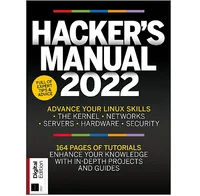Hackers are smuggling malware behind fake copyright infringement emails
Your website is probably not hosting copyrighted material

A new email campaign is seeking to encrypt as many endpoints with the Lockbit 2.0 ransomware as it can. Given the contents of the email being distributed, it would seem the campaign is aimed at webmasters and website owners.
The email “warns” the victim that their website is hosting copyright-protected content, and that they’re infringing on that copyright. It also urges the victim to remove the content from their websites immediately, or face legal action.
But here’s the big red flag - instead of simply listing the copyrighted content directly in the email, the contents are shared in a password-protected .ZIP archive.
Share your thoughts on Cybersecurity and get a free copy of the Hacker's Manual 2022. Help us find how businesses are preparing for the post-Covid world and the implications of these activities on their cybersecurity plans. Enter your email at the end of this survey to get the bookazine, worth $10.99/£10.99.
Evading email protection
The archive contains a compressed file, an executable file posing as a PDF document. The executable is an NSIS installer, loading the LockBit 2.0 ransomware which, in turn, encrypts all of the files on the endpoint.
By wrapping the file and placing it in a password-protected archive, the attackers hope to evade their payload being detected by email security tools.
Copyright claims are not exactly a novelty when it comes to distributing malware, the publication has found. Earlier this year, there had been “numerous” emails of this sort, disrtibuting the likes of BazarLoader, or the Bumblebee malware loader.
LockBit 2.0 is by far the most widespread ransomware variant, security researchers from NCC group have said. Allegedly, LockBit 2.0 accounted for 40% of all ransomware attacks that happened in May this year.
Sign up to the TechRadar Pro newsletter to get all the top news, opinion, features and guidance your business needs to succeed!
Ransomware is an extremely popular type of malware as it holds the promise of great earnings. Businesses are advised to educate their employees how to spot phishing emails, keep their software and hardware updated, and install advanced antivirus solutions.
Via: BleepingComputer
Sead is a seasoned freelance journalist based in Sarajevo, Bosnia and Herzegovina. He writes about IT (cloud, IoT, 5G, VPN) and cybersecurity (ransomware, data breaches, laws and regulations). In his career, spanning more than a decade, he’s written for numerous media outlets, including Al Jazeera Balkans. He’s also held several modules on content writing for Represent Communications.
